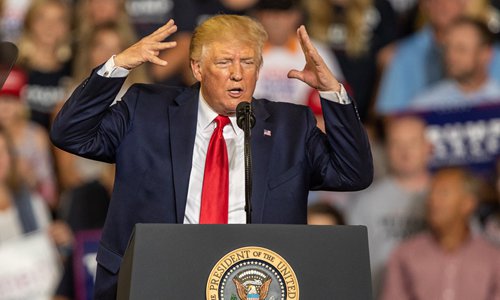
Photo: IC
US President Donald Trump targeted four non-white Democratic congresswomen on Sunday, telling them to "go back and help fix the totally broken and crime infested places from which they came." The words of the capricious president again hogged headlines.
Democratic congressmen came forward to attack Trump's racist views. House Speaker Nancy Pelosi urged House Democrats to support a resolution to condemn Trump's xenophobic tweets. The four congresswomen who were attacked by Trump also fought back. Even Lindsey Graham, US Republican senator from South Carolina and one of Trump's most loyal allies on Capitol Hill, said that Trump should avoid personal attacks.
US House of Representatives on Tuesday passed a resolution condemning Trump's "racist comments," but only four Republicans supported it. The controversy over Trump's tweets yet again exposes the degree of adversarial relationship between the two parties.
The four Democratic congresswomen are Alexandria Ocasio-Cortez, who is often referred to by her initials AOC, Rashida Tlaib from Michigan, Ilhan Omar from Minnesota and Ayanna Pressley from Massachusetts. They are all progressive, minorities and young congresswomen who just joined the Congress.
Led by AOC, the four formed an unofficial alliance. They dare to challenge establishment leaders in the party and act proactively on issues involving immigrants and health insurance. They firmly oppose Trump. So this time it led to Trump triggering the conflict intentionally instead of appearing to act on impulse.
This is not the first time that Trump has posted controversial comments about women. But this time, race has been dragged into the controversy. It is race that Trump wants to keep hammering away at.
Trump's only aim is to make every effort to pave the way for getting himself reelected in 2020. Specifically, he has three arrows in his quiver. First, to take on the progressive wing of the Democratic Party, which over the past three years has shown a proclivity to turn to the left.
Democratic socialism is on the rise within the party, and progressive forces are shaping its policy agenda. The right-wing populist forces represented by Trump are clearly incompatible with the progressives. The four Democratic congresswomen happen to be young progressive voices. Attacks on them are also meant to strike a blow at the progressives.
Second, Trump wants to heat up racial issues so that he can win more support for the 2020 election. Quite a few Trump supporters are white nationalists who believe that their dominant position in US society is being shaken by immigrants. They either show sympathy, or offer support, for Trump's tough immigration policy. Trump is playing on his base's economic and cultural anxieties. As such, as long as Trump thinks it's necessary, he will keep playing the racial card.
Third, the conceited Trump wants to satisfy his vanity. Since he is addicted to media attention, he cannot bear the four congresswomen hogging more media limelight than him.
Nonetheless, the row between Trump and the congresswomen's group is not good news for Republicans. Voter turnout in 2020 is expected to reach the highest level in decades with as many as two-thirds of eligible voters likely to cast a ballot. Young people under 30, minorities and college-educated whites who are ideologically close to Democrats are believed to be key voters. They tend to react strongly to Trump's racist comments. What Trump has done is nothing more than shooting himself in the foot, as it is likely to affect Republicans' chances of victory in 2020 elections.
For Democrats, it's an ideal opportunity to reunite the party and repair the rift between the senior level of the organization and progressives. But given the inherent wrangling between the two sides, it's difficult to bridge differences.
With change of the demographic structure, other ethnic groups will inevitably play a more important role in the political arena. Trump's fulminations on racial issues are unlikely to change the trend. After all, the US is no longer a country that prioritizes political correctness. It's not known where Trump will lead the US, but he is quite unlikely to "Make America Great Again."
The author is an assistant research fellow at the China Institute of International Studies. opinion@globaltimes.com.cn
